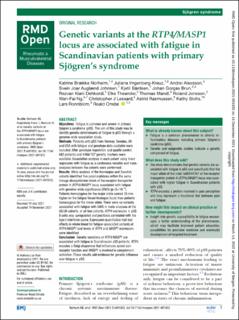| dc.contributor.author | Norheim, Katrine Brække | |
| dc.contributor.author | Imgenberg-Kreuz, Juliana | |
| dc.contributor.author | Alexsson, Andrei | |
| dc.contributor.author | Johnsen, Svein Joar Auglæn | |
| dc.contributor.author | Bårdsen, Kjetil | |
| dc.contributor.author | Brun, Johan Gorgas | |
| dc.contributor.author | Dehkordi, Rezvan Kiani | |
| dc.contributor.author | Theander, Elke | |
| dc.contributor.author | Mandl, Thomas | |
| dc.contributor.author | Jonsson, Roland | |
| dc.contributor.author | Ng, Wan-Fai | |
| dc.contributor.author | Lessard, Christopher J | |
| dc.contributor.author | Rasmussen, Astrid | |
| dc.contributor.author | Sivilis, Kathy | |
| dc.contributor.author | Rönnblom, Lars | |
| dc.contributor.author | Omdal, Roald | |
| dc.date.accessioned | 2022-04-19T12:58:41Z | |
| dc.date.available | 2022-04-19T12:58:41Z | |
| dc.date.created | 2022-02-04T14:28:08Z | |
| dc.date.issued | 2021 | |
| dc.identifier.issn | 2056-5933 | |
| dc.identifier.uri | https://hdl.handle.net/11250/2991351 | |
| dc.description.abstract | Objectives Fatigue is common and severe in primary Sjögren’s syndrome (pSS). The aim of this study was to identify genetic determinants of fatigue in pSS through a genome-wide association study.
Methods Patients with pSS from Norway, Sweden, UK and USA with fatigue and genotype data available were included. After genotype imputation and quality control, 682 patients and 4 966 157 genetic markers were available. Association analysis in each cohort using linear regression with fatigue as a continuous variable and meta-analyses between the cohorts were performed.
Results Meta-analysis of the Norwegian and Swedish cohorts identified five polymorphisms within the same linkage disequilibrium block at the receptor transporter protein 4 (RTP4)/MASP1 locus associated with fatigue with genome-wide significance (GWS) (p<5×10−8). Patients homozygous for the major allele scored 25 mm higher on the fatigue Visual Analogue Scale than patients homozygous for the minor allele. There were no variants associated with fatigue with GWS in meta-analyses of the US/UK cohorts, or all four cohorts. RTP4 expression in pSS B cells was upregulated and positively correlated with the type I interferon score. Expression quantitative trait loci effects in whole blood for fatigue-associated variants at RTP4/MASP1 and levels of RTP4 and MASP1 expression were identified.
Conclusion Genetic variations at RTP4/MASP1 are associated with fatigue in Scandinavian pSS patients. RTP4 encodes a Golgi chaperone that influences opioid pain receptor function and MASP1 is involved in complement activation. These results add evidence for genetic influence over fatigue in pSS. | en_US |
| dc.language.iso | eng | en_US |
| dc.publisher | BMJ | en_US |
| dc.rights | Navngivelse-Ikkekommersiell 4.0 Internasjonal | * |
| dc.rights.uri | http://creativecommons.org/licenses/by-nc/4.0/deed.no | * |
| dc.title | Genetic variants at the RTP4/MASP1 locus are associated with fatigue in Scandinavian patients with primary Sjögren’s syndrome | en_US |
| dc.type | Journal article | en_US |
| dc.type | Peer reviewed | en_US |
| dc.description.version | publishedVersion | en_US |
| dc.rights.holder | Copyright 2021 The Author(s) | en_US |
| dc.source.articlenumber | e001832 | en_US |
| cristin.ispublished | true | |
| cristin.fulltext | original | |
| cristin.qualitycode | 1 | |
| dc.identifier.doi | 10.1136/rmdopen-2021-001832 | |
| dc.identifier.cristin | 1997901 | |
| dc.source.journal | RMD Open | en_US |
| dc.identifier.citation | RMD Open. 2021, 7, e001832. | en_US |
| dc.source.volume | 7 | en_US |

